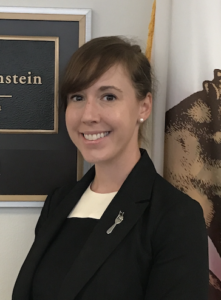Rheumatologist Christina D. Downey, MD, assistant professor of medicine at Loma Linda University School of Medicine, Calif., just became the new chair of the ACR’s Committee on Government Affairs (GAC). She has been a member of the committee since she was a rheumatology fellow and most recently served as the committee’s liaison with the Committee on Rheumatologic Care (CORC).

Dr. Downey
Dr. Downey’s choice to specialize in rheumatology came after exploring a rather circuitous route of alternatives. She first wanted to specialize in psychiatry. Majoring in neurobiology as an undergraduate, she then thought she might become a brain surgeon. “And then I scrubbed in on my first surgery and said, ‘absolutely not—no surgery for me!’” An intensive care rotation was not a match either. When she “found” rheumatology, she was immediately taken with the complexity of rheumatic diseases and the ability to make a difference in her patients’ lives. The longevity of the physician-patient relationship is also a draw, she notes.
In her three-year term as GAC chair, Dr. Downey will support the committee’s work on developing effective liaisons with governmental and nongovernmental research support agencies, including active engagement with congressional members and ACR staff on issues related to healthcare delivery, financing and reimbursement.
A Difference over Time
Dr. Downey became involved in advocacy early in her career as a participant in the inaugural class of the Advocacy 101 program. This training program, which started in 2015, was originally proposed by William F. Harvey, MD, MSc, FACR, clinical director of the Arthritis Treatment Center, Tufts Medical Center, Boston, and advanced by Sarah M. Doaty, MD, FACP, director of the Division of Rheumatology, Alaska Native Tribal Health Center, Anchorage, and Elizabeth “Blair” Solow, MD, associate professor of medicine, UT Southwestern Medical Center, Dallas, and immediate past chair of GAC. Since that first experience in Advocacy 101, Dr. Downey has volunteered with the ACR in numerous leadership and advocacy roles, including helping to lead Advocacy 101 and serving as a member of the ACR’s delegation to the American Medical Association House of Delegates.
Dr. Downey’s attraction to the GAC stemmed from her realization that government policies can have a direct effect on both patient care and the practice of rheumatology. She worries that some rheumatologists may eschew engaging with policy advocacy due to a misperception that it means delving into “the dirty business” of politics. She wants to dispel this myth: As policy advocates, she says, physicians play a vital role in explaining to policymakers how policies and laws affect patients and the profession. Otherwise, she says, government officials “will be making decisions based on erroneous information.”

